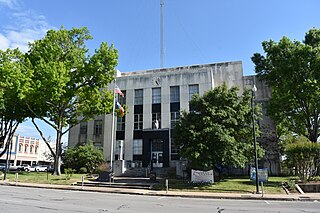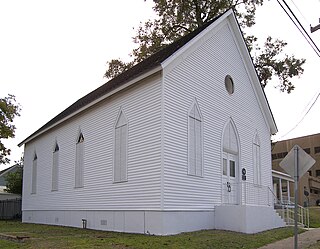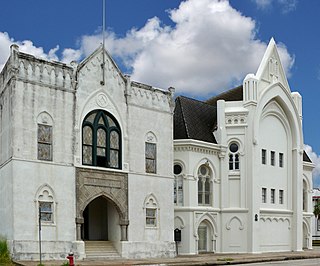The history of the Jews in Brenham, Texas; covers a period of over 140 years. As one of the first areas in Texas, outside of major population centers, to develop a sizable Jewish population, the community boasts many things of historical note. The Brenham community was formally organized in 1885. [1] [2]
Early Jewish settlers arrived in Brenham, Texas, during the 1860s. With the arrival of Jewish merchants, Brenham's retail and wholesale trade expanded further. [1] B. Levinson, an original founder, arrived in 1861. The builders of the Simon Theatre, the Simon family, arrived in 1866. These individuals became active in the business community of Brenham, Texas, and as other Jewish settlers arrived, the need for a synagogue grew. [3] [4] Early leaders were: Rabbi Israel L. Fink as first president, F. Susnitsky as vice president, L.Z. Harrison, J. Lewis, Abe Fink. These men were part of the 20 original charter members of B'nai Abraham Synagogue. [4]
B'nai Abraham Synagogue was constructed in 1893, after the first structure caught fire in 1892. [3] Viewing the Orthodox synagogue from the outside, the building appears humble. [5] According to James L. Hailey, "[i]n the 1990s the synagogue was believed to be the oldest Orthodox Jewish synagogue to have been in continuous use in Texas." [4] The building was relocated to the Northwest Hills neighborhood of Austin in 2015. [6] [7]
The B'nai Abraham Cemetery is a Jewish cemetery located in Brenham and associated with B'nai Abraham Synagogue. It is located near Blinn College, west of Brenham's town square. This cemetery is the resting place for many notable Jewish Texans, such the Simon family and Rosa Levin Toubin. [5] [8] [9]
Around 1850, Alex Simon (1823 – October 4, 1906), a citizen of The Republic of Texas [8] who was born in Pyzdry, Poland, to Michael Gabryel and Ruchel Simon and grew up in Konin, Poland, arrived in Brenham. His arrival marked the beginning of the influential Simon family's involvement in the Brenham Jewish community. Alex Simon was one of the founders and builders of the B'nai Abraham Synagogue. [4] According to architect Robert P. Davis, "[h]e was also one of the principal investors in the Gulf, Colorado and Santa Fe Railroad...which brought Jewish immigrants up from Galveston through the Brazos River valley to Bryan and out to San Angelo." [5] Alex Simon's son, James Simon (March 8, 1858 – August 1, 1925) [8] is known for having financed the construction of the Simon Theatre. Historically, Simon family members have been buried at the B'nai Abraham Cemetery. [5] [9]
The history of the Brenham community has been written by the Jewish Texan historian, Rosa Levin Toubin (June 21, 1897 – August 14, 1989). [8] A Brenham native, Rosa Levin Toubin, daughter of Joe Levin (September 21, 1874 – March 20, 1954) who was a founder of the B'nai Abraham Synagogue. [10] Rosa Levin Toubin attended Blinn College and Rice University and on June 26, 1925, she married Sam H. Toubin (August 25, 1892 – September 17, 1982) [8] who "owned and operated the New York stores in nine towns in Texas". [11] Concerning the Brenham community, in 1980 Rosa Levin "Mrs. Sam" Toubin wrote the texts, Colorful Brenham Community has history of over 120 years. [12] and History of B'nai Abraham Synagogue. [13]
Leon Toubin, a Jewish Texan community and business leader, is the present caretaker of B'nai Abraham Synagogue and the spokesperson for the community. [2] [5] In the text Lone Stars of David: The Jews of Texas, Leon Toubin discusses the history of the Brenham community. He states that the synagogue has "holy scriptures and everything ... [the] only thing we need is Jewish people." [10] In the text, Growing Up Jewish in America: An Oral History, Toubin discusses the descendants of the Brenham community and states that at one time they, "were probably all Jewish once, but we're Lutheran now". [14]
Toubin tells a similar story for the PBS special one-hour documentary, At Home on the Range: Jewish Life in Texas. This story concerns former Washington County Sheriff Goldberg. Toubin states that, "The sheriff we had here was named Goldberg. I got a call from a Goldberg in Houston. He said: 'Leon, I want to ask you a question. There’s a sheriff in Brenham named Goldberg, is he Jewish?' So I stopped him on the street one day and said: 'Sheriff I want to ask you a question. Are you Jewish?' The sheriff said: 'Leon, I was probably Jewish. But the family came here and there weren’t any Jewish girls to marry. Everyone intermarried and I'm Lutheran today. But I was probably Jewish at one time." [15]
The Jewish residents of the Brenham State School have a history of celebrating Jewish holidays. The Houston Chronicle reported that five Jewish residents from Brenham State School participated in Rosh Hashana with the Richmond State School in 2000. [16] The Jewish residents of the Brenham State School also celebrated Passover with the Richmond State School in 2002. [17]
On September 18, 2006, Congregation Beth El of Missouri City, Texas, participated in celebrating the High Holy Days with Jewish residents from both State Schools. These services were led by Rabbi Dovid Goldstein from the Chabad outreach in Houston. [18]
American Jewish Congress v. Bost is an establishment clause lawsuit concerning the separation of church and state in Brenham, Texas. [19] The case is the first constitutional challenge to a charitable choice contract. [20] In the community of Brenham, the American Jewish Congress and the Texas Civil Rights Project filed a lawsuit against a social services program that they believed used a tax-funded jobs program to support religious practices that violated the separation of church and state. Other accusations include use of funds to proselytize, purchase bibles, and coerce participants to "accept Jesus". [21] [22]
On May 21, 2002, the Houston Chronicle reported that the case would be sent to federal district court. [23] The lawsuit went back and forth between state and federal courts and was twice appealed. In January 2003, the lawsuit that is believed to be the first constitutional challenge to a "charitable choice" contract, came to a conclusion. The case was finally dismissed "on the ground that there was no live controversy". [20]
The September 30, 2005, edition of USA Today listed the Brenham community as one of "10 great places to share history of the Jewish faith". [24]

Brenham is a city in east-central Texas, United States, and the county seat of Washington County, with a population of 17,369 according to the 2020 U.S. census.
Jews in Philadelphia can trace their history back to Colonial America. Jews have lived in Philadelphia since the arrival of William Penn in 1682.
Abraham Cohen Labatt was an American Sephardic Jew who was a prominent pioneer of Reform Judaism in the United States in the 19th century, founding several early congregations in the South and in San Francisco after the Gold Rush. A merchant, in the 1830s he helped pioneer trade between United States interests in Charleston and those in Texas and Mexico.

Congregation B'nai Israel is a Reform Jewish congregation and synagogue located in Galveston, Texas, in the United States. Organized by German Jewish immigrants in 1868, it is the oldest Reform congregation and the second chartered Jewish congregation in the state.

The B'nai Abraham Synagogue is an Orthodox Jewish synagogue and former congregation from Brenham, Texas, in the United States. The congregation was organized in 1885.
Jewish Texans have been a part of the history of Texas since the first European explorers arrived in the region in the 16th century. In 1990, there were around 108,000 adherents to Judaism in Texas. More recent estimates place the number at around 120,000.

Henry Cohen was a British-American rabbi, scholar, community activist and writer who served most of his career at Congregation B'nai Israel in Galveston, Texas, from 1888 to 1949. He came to the United States in 1885, during a period of rapid and massive growth related to early 20th-century immigration from eastern and southern Europe. In Texas, he organized the Galveston Movement, which worked from 1907 to 1914 to attract eastern European Jewish immigrants to Galveston and the Gulf Coast as a destination, as an alternative to the better known Northeastern cities. Ten thousand such immigrants entered at Galveston.

James Lee Kessler, the founder of the Texas Jewish Historical Society, was the first native Texan to serve as rabbi of Congregation B'nai Israel in Galveston, Texas.

Congregation Beth Jacob is a Conservative Jewish synagogue located at 2401 Avenue K, Galveston, on Galveston Island, Texas, in the United States. The present synagogue was built by Austrian, Russian and Hungarian immigrants in 1931. It was listed on the National Register of Historic Places in 2024.

Temple Freda, built in 1912, is a former synagogue in Bryan, Texas, in the United States. The building was added to the National Register of Historic Places on September 22, 1983.
American Jewish Congress v. Bost was an Establishment Clause lawsuit concerning the separation of church and state in Brenham, Texas. The case was the first constitutional challenge to a charitable choice contract.
The Texas Jewish Historical Society,, which began in 1980, is a society dedicated to the preservation of Jewish history in Texas.

Jews have inhabited the city of Galveston, Texas, for almost two centuries. The first known Jewish immigrant to the Galveston area was Jao de la Porta, who, along with his brother Morin, financed the first settlement by Europeans on Galveston Island in 1816. de la Porta was born in Portugal of Jewish parentage and later became a Jewish Texan trader. In 1818, Jean Laffite appointed de la Porta supercargo for the Karankawa Indian trade. When Laffite left Galveston Island in 1820, de la Porta became a full-time trader.
Leon Toubin, known locally as "The Last Jew of Brenham", a Jewish Texan civic leader, philanthropist, and historian, was the caretaker of B'nai Abraham Synagogue, which he began attending in the late 1930s as part of the daily minyan.
Jewish settlement in Brazos County, Texas, began in 1865. This history includes the present Jewish communities and individuals of Brazos County and Texas A&M University.
The history of Jews in South Florida dates back to the 19th century. Many South Florida Jews are Ashkenazi, and Latin American. Many are also French, Moroccan, Syrian, Bukharan, and Israeli. There is a significant Sephardic and Mizrachi population as well.

Congregation Beth Israel is a Reform Jewish congregation and synagogue located at 5600 North Braeswood Boulevard, in Houston, Texas, in the United States. The congregation, founded in 1854, is the oldest Jewish congregation in Texas; and it operates the Shlenker School.

Congregation Beth Yeshurun is a Conservative synagogue at 4525 Beechnut Street, Houston, Texas, in the United States.

The Jewish community of Houston, Texas has grown and thrived since the 1800s. As of 2008, Jews lived in many Houston neighborhoods and Meyerland is the center of the Jewish community in the area.